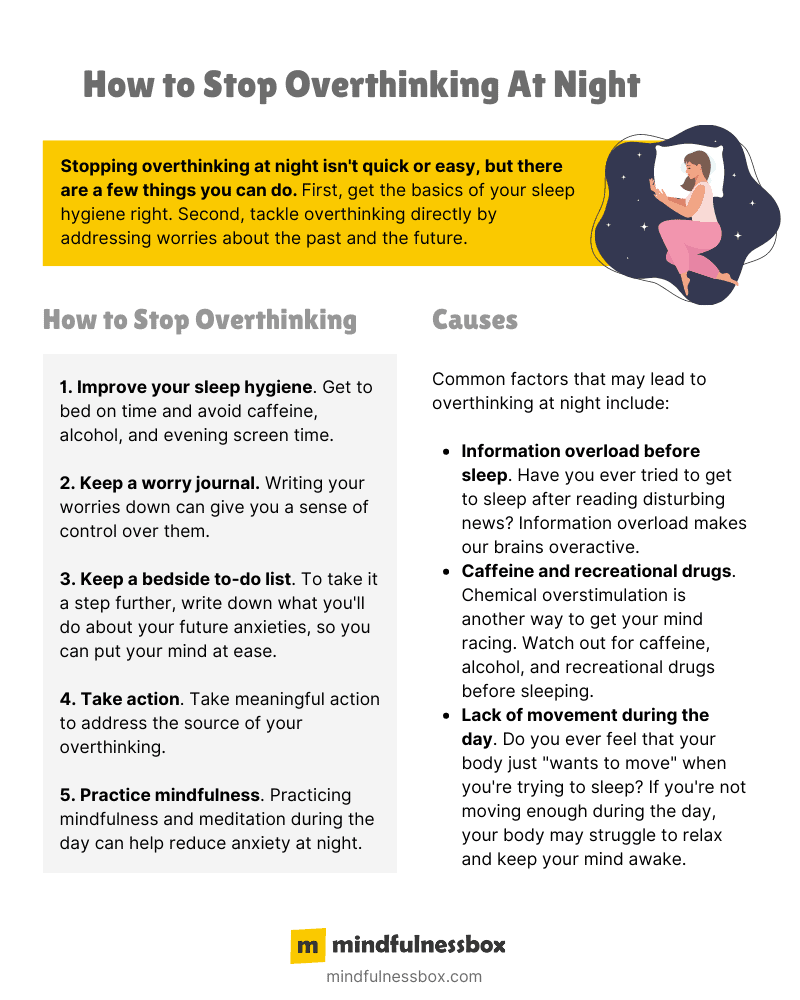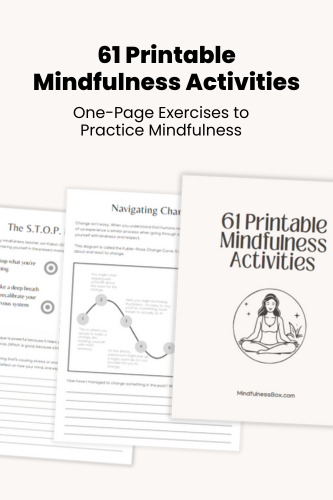Wondering how to stop overthinking at night? First, get the basics of your sleep hygiene right. Second, tackle overthinking directly by addressing your anxiety and worry about the past and the future.
Ever say to yourself:
“I want to sleep but my brain won’t stop talking to itself“?
Get dozens of one-page exercises to help practice mindfulness, meditation, gratitude, and self love. Perfect for printable handouts when teaching mindfulness to groups, students, or in the workplace.
To see examples, plus a full list of the 61 exercises included, click below.
It’s a common problem. 70% of US adults say they don’t get enough sleep at least one night a month, and 11% say they don’t get enough sleep every night.
Overthinking is frequently the culprit. As we lie in bed thinking about the day that’s gone by, and planning the day to come, anxieties and worries spring up. The problems of today and tomorrow show up just as we’re trying to get some well-deserved rest.
How to reduce overthinking at night

Stopping overthinking isn’t an easy or quick process. However, there are a few things you can do.
1. Improve your sleep hygiene

First, reduce any other issues that may be affecting your sleep.
Get the basics of your sleep hygiene right.
Get to bed on time, avoid caffeine and alcohol before sleeping, exercise during the day and avoid stimulating content and blue light in the hour before bed.
2. Keep a worry journal

Mental blocks to falling asleep often show up in two areas: worries about the past, and anxiety about the future.
A worry journal is a notebook in which you write down your worries. You can keep it by your bedside to access as needed, or even better, journal before going to bed (so your mind doesn’t begin to associate the bedroom with worrying).
The act of doing a “brain dump” in your journal can help you to organize your thoughts and to address them one at a time. It can also help you to feel like you’re doing something about your worries (whether or not you actually are). Worry journals can be helpful for both overthinking and insomnia.
If you find yourself becoming too negative after listing all of your worries—which, after all, makes sense in a worry journal—you may want to add a few items of gratitude before finishing. This can help to subtly shift your frame of mind.
In doing this, you’ve acknowledged the worry by writing it down, and are telling yourself you don’t need to hold it so closely in your mind. Your mind can trust that by writing it down, you’ll be able to come back to it later.
In the meantime, taking time to express gratitude can help you go back to bed in a more positive state than you left.
3. Keep an bedside to-do list

Managing anxieties about the future might involve writing down what you’ll do to address those worries in the day to come
If you’re experiencing overthinking about something that you have no control over, simply writing it down may help.
But if your mind is racing with ideas about the future, or actions you need to take tomorrow, or next week, it’s best to calm your mind by showing it you have everything under control.
This is where keeping an “overthinking to-do list” next to your bed comes in.
When your mind thinks of something it wants to take action on, instead of feeling like you need to “hold” the idea until tomorrow, you write it down.
One by one, as ideas come up, you write them on your to-do list as a reassurance to your mind that each will be dealt with. You can even put them in your calendar, for extra reassurance.
4. Take action to address the source of your overthinking

Sometimes, we get caught up in cyclical overthinking patterns about issues that we have the capability to do something about.
For example, let’s say you can’t fall asleep because you’re worried about money.
You won’t be able to fix it overnight, but you can start taking action immediately in a meaningful way.
Over time, you can ease or even erase the source of the overthinking.
5. Practice mindfulness to reduce anxiety during the day

The more you’re able to improve the quality of your days, the less overthinking you’ll have to do at night.
If you’re finding that your days are frequently filled with worry and anxiety, tackling your daytime experience with mindfulness practices like meditation may help your evening experience, too.
There won’t be such an accumulation of difficult emotions by the time the end of the day rolls around.
Causes of overthinking at night

The main cause of overthinking at night is that your mind is dwelling on worry and anxiety about the future or about the past. Or, you may just be stuck on any number of cognitive loops. Sometimes, overthinking can lead to more overthinking.
While the primary root cause of overthinking is unresolved anxiety and worry, there are a few situations that can make the problem worse.
- Information overload before sleep. Have you ever tried to get to sleep after watching an intense action movie or horror movie, or scrolling through disturbing news on social media? These are the kind of activities that get our brain moving into overactive territory.
- Caffeine and recreational drugs. Chemical overstimulation is another way to get your mind racing. Watch out for coffee or caffeinated tea in the hours before bed (for high caffeine sensitivity, you may need to drop caffeine entirely). Certain recreational drugs can lead to similar stimulative effects or can make your mind more susceptible to overthinking.
- Lack of movement during the day. Do you ever feel that your body just “wants to move” when you’re trying to get to sleep? Whether it’s restless leg syndrome (present in 5-10% of the population) or simply restlessness from not moving during the day, your body can keep your mind awake and lead to overthinking.
Any one of these or other impediments to sleep can lead to you staying awake later, and the longer you’re lying in bed awake, the higher the chance you’ll drift toward overthinking.
However, overthinking is not at its core caused by these other reasons for staying awake. In the end, you’re dealing with anxiety and worry. Addressing that problem directly will give you the best chance of reducing overthinking.
The best way to stop overthinking before sleep

The best way to stop overthinking before bed is to tackle the source of your overthinking.
That doesn’t mean you shouldn’t address the basics. Start with ensuring you have proper sleep hygiene and aren’t doing anything that is making your overthinking worse, like information overload or caffeine before bed. Exercise may also help by making you feel more tired and helping elevate your mood.
But at its root, overthinking is an issue of worry and anxiety, which means that other techniques to fall asleep may be avoiding the real problem. Instead of avoiding the issue, acknowledge the stream of thoughts running through your mind and comfort your brain by writing them down.
If they’re items you need to take action on, put them on a separate overthinking to-do list that you’ll look at the next day. Practicing mindfulness during the day may also help by reducing the burden of worry and anxiety that you’re carrying.
With a holistic approach covering not only your sleep hygiene but addressing your racing thoughts and worries directly, you’ll be more likely to stop overthinking at night and fall asleep.
Further reading
To learn meditation and mindfulness skills that may help your overthinking at night, read these articles:
- 7 Movement Meditation Practices to Clear Your Mind
- Why I Stopped Reading the News
- 21 One Minute Mindfulness Exercises
Frequently asked questions
Can overthinking keep you up at night?
Yes. It makes sense, when you think about it.
At night, after a busy day, you’re finally getting a chance to rest and reflect on everything that’s happened. Your mind can also start drifting towards the day to come, and may go into planning and worry mode.
So it’s no surprise that overthinking often rears its head just as we most need to quiet our mind for sleep. You may do everything else right—going to bed early, having a comfortable bed, keeping the room cool, avoiding electronics and blue light—but overthinking can still keep you awake.
Then you try to nudge yourself to sleep with one of the commonly recommended methods—reading, listening to music, meditating—but you find that you’re only getting further away from falling asleep.

My mindfulness practice kicked off in 2016 with a ten-day silent retreat. Since then, I’ve read dozens of books about mindfulness and completed hundreds of hours of meditation. Thinking about what makes humans happy, calm, and peaceful is endlessly fascinating to me.


